初中英语语法专项习题——情态动词
初中英语语法之情态动词用法及练习题(含答案)
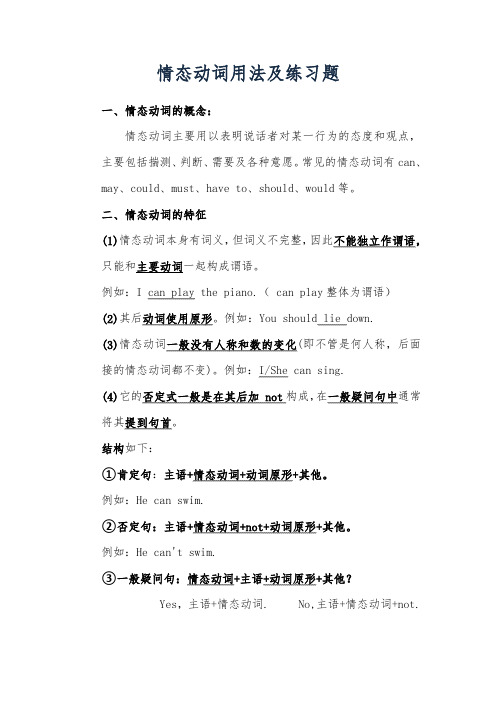
情态动词用法及练习题一、情态动词的概念:情态动词主要用以表明说话者对某一行为的态度和观点,主要包括揣测、判断、需要及各种意愿。
常见的情态动词有can、may、could、must、have to、should、would等。
二、情态动词的特征(1)情态动词本身有词义,但词义不完整,因此不能独立作谓语,只能和主要动词一起构成谓语。
例如:I can play the piano.( can play整体为谓语)(2)其后动词使用原形。
例如:You should lie down.(3)情态动词一般没有人称和数的变化(即不管是何人称,后面接的情态动词都不变)。
例如:I/She can sing.(4)它的否定式一般是在其后加 not构成,在一般疑问句中通常将其提到句首。
结构如下:①肯定句:主语+情态动词+动词原形+其他。
例如:He can swim.②否定句:主语+情态动词+not+动词原形+其他。
例如:He can't swim.③一般疑问句:情态动词+主语+动词原形+其他?Yes,主语+情态动词. No,主语+情态动词+not.例如:-Can he swim?-Yes, he can. No,he can’t.④特殊疑问句:特殊疑问词+情态动词+主语+动词原形+其他? 例如: -What can he do ?-He can swim.三.情态动词的用法(1)can的用法①表示“能力”Can you sing?你会唱歌吗?②表示客观条件允许You can listen to music here.你可以在这里听音乐。
You can’t park your car here. 你不能在此停车③can用在否定句和疑问句中时,有时表示说话人的怀疑、惊异、或猜测:It can’t be true.这不可能是事实Can it be true?这可能是真的吗?④.can的搭配用法:A.as +adj./adv.+as one can/could “尽可能,尽量……”,如:The man took his child to the hospital as quickly as he could.这个男人尽可能快地将孩子送去医院。
初中英语情态动词练习题(含答案)

初中英语情态动词练习题(含答案)必修模块3系统语法梳理——情态动词⽤法(学⽣版)⼀、情态动词基本⽤法●情态动词语⽓强弱对⽐●情态动词重点⽤法解析1. can与could(1)表能⼒,常译为“____________”,如:例:我会说⽇语,但是不会写。
(2)表⽰允许,常译为“____________”,could可以表⽰更为委婉的请求或许可,如:例:你可以在这屋⼦⾥吸烟。
(3)表推测,常⽤来表⽰“惊讶、怀疑、不相信等态度”,多⽤于___________或___________中,could表⽰可能性⽐can ⼩,如:例:他是个诚实的⼈,他不可能撒谎。
2. may与might(1)表⽰许可或征询对⽅许可,常译为“____________”,表⽰征询许可时,may与can / could可以换⽤,但might ⽐may的语⽓更婉转⼀些;对含may的⼀般疑问句的肯定回答可⽤_________或________,否定回答⽤___________或__________,如:例:—我可以进来吗?—不,你不能进来。
(2)表推测,译为“______________________”,多⽤于肯定句或否定句中;may not表⽰“___________”,might ⽐may的可能性⼩,如:例:他现在可能很忙。
(3)may⽤于祈使句表“祝愿”例:祝你成功!(4)may / might as well do sth.3. will与would(1)表⽰“请求、建议”,⼀般⽤于_________⼈称的疑问句中,would⽐will更婉转(2)表⽰“意志、愿望和决⼼”,⼀般译为_________________,would表⽰过去的意愿和决⼼例:我再也不会做那件事了。
(3)表⽰习惯性动作或某种倾向例:鱼离开⽔就会死。
(1)shall⽤于__________________⼈称做主语的疑问句中,表⽰说话⼈征求对⽅的意见或向对⽅请⽰例:今晚我们⼲什么呢?(2)shall⽤于主语是第⼆、第三⼈称做主语的句⼦中,表⽰说话⼈对对⽅的_____________________________或⽤于______________________________,表⽰强制性例:如果你不努⼒学习,你会学习不及格。
初一英语情态动词单选题30题

初一英语情态动词单选题30题1. The teacher says we ______ speak loudly in the library.A. canB. couldC. can'tD. couldn't答案:C。
本题考查情态动词的用法。
can 表示“能够,可以”,could 是can 的过去式,语气更委婉。
can't 表示“不能”,couldn't 是can't 的过去式。
在图书馆不能大声说话,所以用can't。
2. I'm not sure if I ______ finish my homework today.A. canB. couldC. mayD. might答案:A。
can 表示有能力做某事,could 语气更委婉,may 和might 表示可能性。
不确定今天是否能完成作业,强调能力,用can。
3. ______ you help me carry this box?A. CanB. CouldC. MayD. Must答案:A。
can 用于请求帮助,could 语气更委婉,may 表示许可,must 表示必须。
这里请求帮助用can 更直接。
4. We ______ listen to the teacher carefully in class.A. canB. couldC. mustD. would答案:C。
must 表示“必须”,在课堂上必须认真听老师讲课,can 和could 表示“能够”,would 表示“将要”,不符合语境。
5. The boy is very weak. He ______ walk by himself.A. canB. can'tC. couldD. couldn't答案:B。
男孩很虚弱,不能自己走路。
can't 表示“不能”,couldn't 是过去式,这里用一般现在时can't 更合适。
初中英语语法专项练习-情态动词
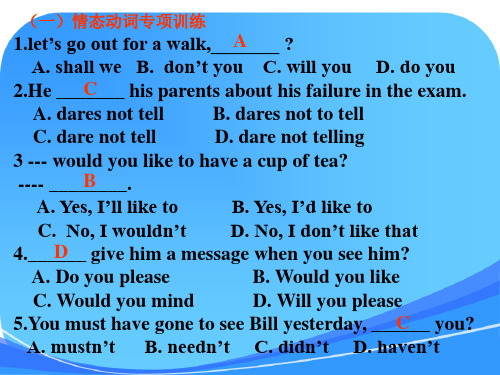
---- ______ Of course, please.And I’d rather he ______
me the truth.
A. Will;inform
C. dare not tell
D. dare not telling
3 --- would you like to have a cup of tea? ---- ____B____.
A. Yes, I’ll like to
B. Yes, I’d like to
C. No, I wouldn’t D. No, I don’t like that
A. be, should have been B. am, should be
C.should be, be D. have been, should have been 7.___C___ out of season, I would have ordered some from
the fruit stand.
(一)情态动词专项训练
1.let’s go out for a walk,___A____ ?
A. shall we B. don’t you C. will you D. do you
2.He ___C____ his parents about his failure in the exam.
A. dares not tell B. dares not to tell
A. If oranges would have been
B. If oranges have not been
C.Had oranges not been
D.Should oranges not have been
初中英语语法情态动词讲解与练习有答案
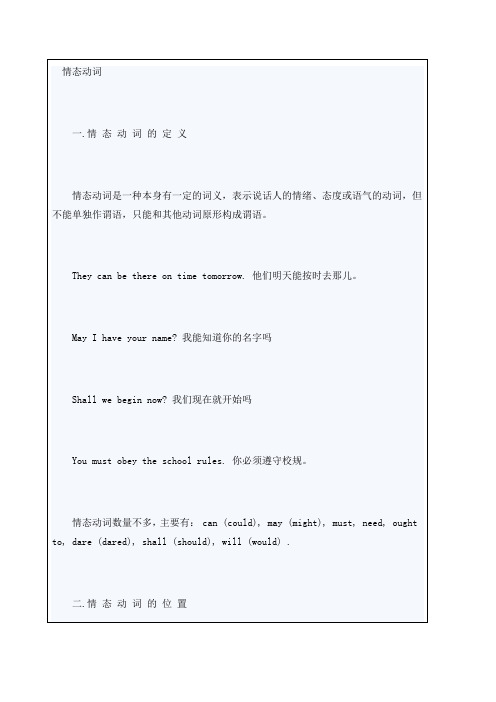
情态动词在句中放在谓语动词之前,谓语动词前若有助动词,则在助动词之前,疑问句中,情态动词放在主语之前。
I can see you. Come here. 我能看见你,过来吧。
He must have been away. 他一定走了。
What can I do for you? 你要什么How dare you treat us like that! 你怎么敢那样对待我们!三.情态动词的特点情态动词无人称和数的变化,情态动词后面跟的动词需用原形,否定式构成是在情态动词后面加“not”。
个别情态动词有现在式和过去式两种形式,过去式可以用来表达更加客气、委婉的语气,时态性不强,可用于过去,现在或将来。
我们称之为“功能用法”。
He could be here soon. 他很快就来。
May I come in? 我可以进来吗?May I use your dictionary? 我可以用你的词典吗?You may put on more clothes. 你可以多穿点衣服。
He said he might lend us some money. 他说他可以借给我们一些钱。
may 否定式为 may not, 缩写形式是mayn’t。
might 是may 的过去式,有两种用法,一种表示过去式,一种表示虚拟语气,使语气更加委婉、客气或对可能性的怀疑。
He told me he might be here on time. 他说他能按时间来。
Might I borrow some money now? 我可以借点钱吗?He might be alive. 他可能还活着。
3. must “必须;应该;一定;准是”,表示说话人认为有必要做某事,命令、You needn't have taken it seriously. 这件事情你不必太认真。
5. dare “敢”,多用在否定或疑问句中。
The little girl dare not speak in public. 小女孩不敢在公众面前说话。
初中英语语法专题--情态动词

初中英语语法专题情态动词一、【情态动词】又叫情态助动词。
它们具有以下特点:⑴它们必须与其他动词连用,即:情态动词+动词原形表示说话人对所述动作的看法,如需要、可能、意愿或怀疑等。
⑵绝大多数情态动词没有人称和数的变化,即第三人称单数不加-s(以be和have 开头的情态动词短语除外)。
⑶在意义上,情态动词具有“多义性"。
例:can既可表示能力,又可表示可能、允许等意义。
有can (could), may (might), must, have to, shall (should, will (would),dare (dared), need (needed), ought to等。
情态动词无人称和数的变化;不能单独使用,必须与其后的动词原形构成谓语。
^^can 表示能力,意为“能会" 表示推测, 意为“可能",常用于否定句和疑问句中表示请求,允许,意为“可以”.^^could 是can 的过去式,意为“能、会”,表示过去的能力在疑问句中表示委婉请求 . ^^may 表示请求、许可,意为“可以" 表示推测,常用于肯定句中,意为“可能、也许".^^might 是may的过去式,表推测,常用于肯定句中,意为“可能、也许” .^^must 表示主观看法,意为“必须、应该”表有把握的推测,用语肯定句 .^^need \表示需要、必须,主要用于否定句和疑问句中。
^^dare 表示敢于,主要用于否定句和疑问句中.^^should 意为“应该”,表示要求和命令表示劝告、建议.^^had better 意为“最好”,表示建议.^^used to意为“过去常常,表示过去的动作、行为.部分情态动词的基本用法:考点一情态动词知识清单1. can的基本用法:⑴表示体力或智力上的能力,即“能够,会”,可与be able to转换。
例:He can speak English. = He is able to speak English。
初中英语语法专项习题-情态动词

初中英语语法专项习题-情态动词1( ) 1 John___ come to see us tonight, but he isn't very sure yet.A. mayB. canC. has toD. must( ) 2 They ___ do well in the exam.A. can be able toB. be able toC. can able toD. are able to( ) 3 -May I take this book out?-No, you___.A. can'tB. may notC. needn'tD. aren't( ) 4 You___ go and see a doctor at once because you're got a fever.A. canB. mustC. dareD. would( ) 5 -Can you speak Japanese?-No, I____.A. mustn'tB. can'tC. needn'tD. may not2( ) 1 -He___ be in the classroom, I think.-No, he ___ be in the classroom. I saw him go home a minute ago.A. can; may notB. must; may notC. may; can'tD. may; mustn't( ) 2 -Shall I get one more cake for you, Dad?-Thanks, but you___, I've had enough.A. may notB. must notC. can'tD. needn't( ) 3 Even the top students in our class can't work out this problem, so it be very difficult.A. mayB. mustC. canD. need( ) 4 He isn't at school. I think he ___ be ill.o A. can B. shall C. must D. has to( ) 5 ___ I take this one?A. MayB. WillC. AreD. Do3( ) 1 The children___ play football on the road.A. can'tB. canC. mustn'tD. must( ) 2 You ___ be late for school again next time.A. mustn'tB. needn'tC. don't have toD. don't need to( ) 3 -Must I do my homework at once?-No, you___.A. needn'tB. mustn'tC. can'tD. may not4( ) 1 His arm is all right. He___ go and see the doctor.A. has not toB. don't have toC. haven't toD. doesn't have to( ) 2 He had to give up the plan, ___ he?A. didB. didn'tC. doesD. doesn't( ) 3 They had to walk here, ___ they?A. mustn'tB. didC. didn'tD. hadn't5( ) 1 He had better stay here, ___ he?A. didn'tB. don'tC. hadn'tD. isn't( ) 2 You'd better___late next time.A. not to beB. not beC. won't beD. don't be( ) 3 You'd better ___ your hair ___ once a month.A. had; cutB. had; cuttedC. have; cutD. have; cutted( ) 4 You___ ask that man over there. Maybe he knows the way. A. had better not to B. had not better C. had better D. had better not 6( ) 1 -Shall we go and visit the History Museum next Sunday? A. Here you are B. Sorry, I can't C. Yes, please D. Let me try ( ) 2 -Why don't you ask Mike to go with us?-Thanks, ___.A. I willB. I won'tC. leanD. I may( ) 3 -___ I take the newspaper away?-No, you mustn't. You____read it only here.A. Must; canB. May; canC. Need; mustD. Must; must7( ) 1 Excuse me. ___ you please pass me that cup?A. DoB. ShouldC. WouldD. Must( ) 2 ___ you like to have another try?A. CouldB. WillC. WouldD. Do( ) 3 -Would you like to go boating with us?-Yes, ___.A. I'd like B. I want C. I'd like to D. I do8( ) 1 You___ worry about your son. He will get well soon.A. needn'tB. can'tC. mustn'tD. have to( ) 2 The poor man needs our help, ___ he?A. needB. needn'tC. doesD. doesn't( ) 3 -Must we do our homework first?-No, you___. You may have a rest first.A. mustn'tB. needn'tC. may notD. can't参考答案:1. 1-5 A D A B B2. 1-5 C D B C A3. 1-3 C A A4. 1-3 D B C5. 1-4 C B C C6. 1-3 B A B7. 1-3 C C C8. 1-3 A D B。
初中英语语法-情态动词

二、表推测的用法
1. must have done过去肯定做了某事 Since the road is wet, it must have rained last night. 不存在 mustn‘t have done 的形式。其否定或疑问形式须用
can(could) 来表示. 例如: He can't have missed the way. I drew him a map. “The dictionary has disappeared. Who could have taken it?”
Did anyone dare (to) admit it?有人敢于承认吗?
He did not dare (to) leave his car there. 他不 敢把车停放在那里。
If he dares to show up at her house I’ll be surprised. 如果他敢出现在她的房子里,我会感到吃惊。
2) Should (ought to)表示推测 时,是指有一定根据的推测,意 为“可能、该”
---When can I come for the photos? I need them tomorrow,
---They ____ be ready by 12:00
3. 表示惊讶的语气
You can never imagine such a gentleman should be so rude to a lady.
1. must
2) 表示推测、可能性(只用于肯定 的陈述句) 1. You’re Tom’s good friend, so you must know what he likes best. 2 . Your mother must be waiting for you now.
初中英语(完整版)情态动词专项练习含解析
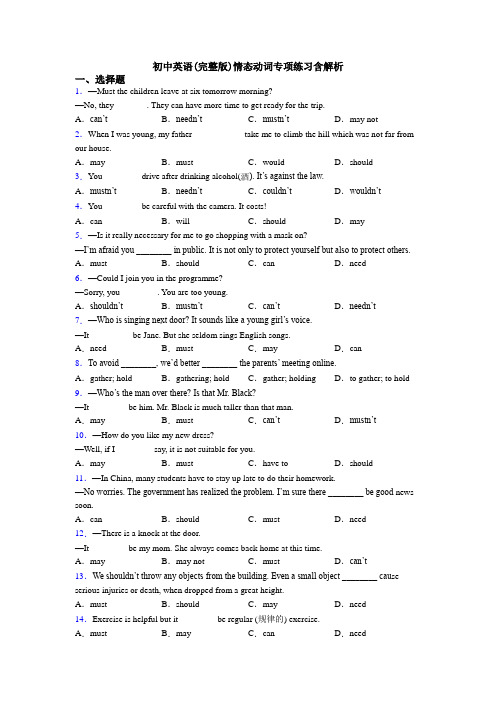
初中英语(完整版)情态动词专项练习含解析一、选择题1.—Must the children leave at six tomorrow morning?—No, they _______. They can have more time to get ready for the trip.A.can’t B.needn’t C.mustn’t D.may not 2.When I was young, my father ___________ take me to climb the hill which was not far from our house.A.may B.must C.would D.should3.You ________ drive after drinking alcohol(酒). It’s against the law.A.mustn’t B.needn’t C.couldn’t D.wouldn’t 4.You ________ be careful with the camera. It costs!A.can B.will C.should D.may5.—Is it really necessary for me to go shopping with a mask on?—I’m afraid you ________ in public. It is not only to protect yourself but also to protect others. A.must B.should C.can D.need 6.—Could I join you in the programme?—Sorry, you ________. You are too young.A.shouldn’t B.mustn’t C.can’t D.needn’t 7.—Who is singing next door? It sounds like a young girl’s voice.—It _________ be Jane. But she seldom sings English songs.A.need B.must C.may D.can8.To avoid ________, we’d better ________ the parents’ meeting online.A.gather; hold B.gathering; hold C.gather; holding D.to gather; to hold 9.—Who’s the man over there? Is that Mr. Black?—It ________ be him. Mr. Black is much taller than that man.A.may B.must C.can’t D.mustn’t 10.—How do you like my new dress?—Well, if I ________ say, it is not suitable for you.A.may B.must C.have to D.should11.—In China, many students have to stay up late to do their homework.—No worries. The government has realized the problem. I’m sure there ________ be good news soon.A.can B.should C.must D.need 12.—There is a knock at the door.—It ________ be my mom. She always comes back home at this time.A.may B.may not C.must D.can’t13.We shouldn’t throw any objects from the building. Even a small object ________ cau se serious injuries or death, when dropped from a great height.A.must B.should C.may D.need 14.Exercise is helpful but it ________ be regular (规律的) exercise.A.must B.may C.can D.need15.You'd better __________ hard from now on, __________ you will fail the exam. A.work; and B.working; or C.working; and D.work; or 16.— Mom, must I clean my room now?— No, you ________. You can do it after dinner.A.needn’t B.mustn’t C.shouldn’t D.can’t17.— Zoe, what do you think is the greatest advantage of shopping online?— At least I ______ spend much time going from shop to shop.A.shouldn’t B.can’t C.needn’t D.mustn’t18.The boy is very brave.I ________ he ________ the tall tree.A.dare say; dares to climbB.dare to say; dare climbingC.dare saying; dares climbD.dare to say; dares climbed19.---Will you be back early this evening?---Yes, but I ________ be a little late. Our boss sometimes has extra work for us.A.may B.must C.need D.will20.—I must go to school today, ________?—No, you ________.You can go as soon as you get well.A.mustn’t I;needn’t B.needn’t I;needn’tC.mustn’t I;mustn’t D.needn’t I;mustn’t21.—Seventy dollars for such a dress! You ________ be joking!—I’m serious. It’s made of silk from Hangzhou.A.must B.need C.will D.can 22.According to the rule, used batteries ________ be dropped in the red bin for harmful wastes. A.may B.would C.should D.might23.You _________ smoke here! Look at the sign. It says "No smoking".A.needn't B.mustn't C.can D.may24.— Listen! Tom ________ be listening to the music while doing his homework.—Let’s go upstairs to remind him to turn it off.A.should B.could C.would D.must25.Never throw objects from the building. Even a small object ________ cause serious injuries, or death, when dropped from a great height.A.must B.should C.may D.need26.— Mum, why do I have to wash hands so many times a day?—You ________ be too careful, for your health.A.can’t B.mustn’t C.may not D.needn’t 27.—Will Jim come to Yangzhou for a holiday?—He ________come and it depends on how much homework he will have.A.may B.should C.must D.need28.—In China, many parents complain that their children have to stay up late to do thehomework.—Don’t worry. The government has realized the problem. I’m sure there ________ be good news soon.A.can B.should C.need D.must29.—________ I see your ID card? We have to check your personal information.—Sure. Here you are.A.May B.Need C.Should D.Must30.—Will dad arrive home at 6 o’clock to have dinner with us this evening?— I think he will, but he ________ not. Sometimes he works extra hours.A.can B.must C.need D.may31.—What is that young lady’s job?—She ________ be a nurse, I’m not sure.A.must B.may C.need D.would 32.—Must we stop the Japanese government discharging nuclear waste water (排放核污水) into the Pacific Ocean?—________. Because everyone should protect our earth and it is bad ________ us to eat the polluted seafood and drink the waste water.A.Yes, we can; of B.No, we mustn’t; of C.Yes, we must; for D.No, we needn’t; for 33.Sometimes smiles ________ be false, hiding other feelings like anger, fear or worry. A.should B.would C.must D.can34.Mr. Black ________ be at home now. He went abroad on vacation last Friday.A.can’t B.mustn’t C.needn’t D.shouldn’t 35.— The sandstorm in Beijing is so serious this year.— Yes, I wonder when we ________ worry about the air we breathe.A.can’t B.mustn’t C.needn’t D.shouldn’t36.For the safety of the passengers, objects like guns ________ be carried on board.A.may not B.needn’t C.might not D.mustn’t 37.—How beautiful the winter jasmines (迎春花) are!—Yes. These golden-yellow flowers ________ be widely seen in my city in March.A.must B.can C.would D.should 38.—Mum, I bought some strawberries on my way home.—Oh, you’re so sweet. But the strawberries ________ be put into the fridge for freshness. A.must B.can C.may D.need39.— What do you think of the show yesterday?— Some of them were really good but others ________ be better.A.will B.must C.need D.can40.I think all the students love the weekends because, to them, they ________ get up early on Saturdays or Sundays.A.mustn’t B.don’t need C.needn’t D.can’t【参考答案】一、选择题1.B解析:B【详解】句意:——孩子们明天早上六点必须离开吗?——不,他们不必。
八年级英语情态动词单选题30题

八年级英语情态动词单选题30题1. In the school sports meeting, I ____ run very fast.A. canB. couldC. mayD. might答案:A。
本题考查can 的用法。
can 表示能力,“能,会”,在一般现在时中常用。
could 是can 的过去式,用于一般过去时。
may 和might 表示可能性,“可能”,不符合此处“在学校运动会上,我能跑得很快”的语境,强调的是能力,所以选A。
2. My little sister ____ sing a beautiful song when she was five.A. canB. couldC. mayD. might答案:B。
此题考查could 的用法。
could 是can 的过去式,此处说“我妹妹五岁的时候就能唱一首好听的歌”,是过去的能力,用could,A 选项can 是一般现在时,不符合过去的时间,C、D 选项may 和might 表示可能性,不符合此处语境,所以选B。
3. At home, I ____ help my mother do the housework.A. canB. couldC. shouldD. would答案:A。
本题考查情态动词的含义。
can 表示“能够,可以”,强调能力;could 是can 的过去式;should 表示“应该”;would 表示“愿意,将要”。
这里说“在家,我能够帮妈妈做家务”,强调能力,所以用can,选A。
4. The teacher said we ____ study hard for the exam.A. canB. couldC. shouldD. might答案:C。
此题考查should 的用法。
should 表示“应该”,“老师说我们应该为考试努力学习”,A 选项can 表示能力,B 选项could 是can 的过去式,D 选项might 表示可能性,均不符合语境,所以选C。
(完整版)初中英语情态动词专项练习题
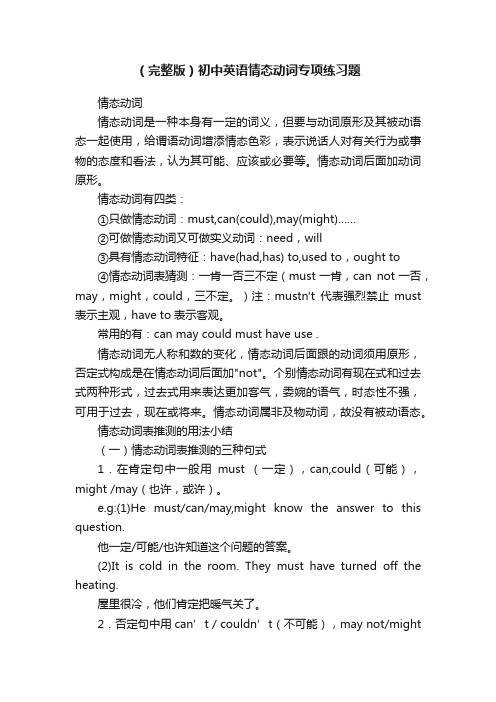
(完整版)初中英语情态动词专项练习题情态动词情态动词是一种本身有一定的词义,但要与动词原形及其被动语态一起使用,给谓语动词增添情态色彩,表示说话人对有关行为或事物的态度和看法,认为其可能、应该或必要等。
情态动词后面加动词原形。
情态动词有四类:①只做情态动词:must,can(could),may(might)……②可做情态动词又可做实义动词:need,will③具有情态动词特征:have(had,has) to,used to,ought to④情态动词表猜测:一肯一否三不定(must一肯,can not一否,may,might,could,三不定。
)注:mustn't代表强烈禁止must 表示主观,have to表示客观。
常用的有:can may could must have use .情态动词无人称和数的变化,情态动词后面跟的动词须用原形,否定式构成是在情态动词后面加"not"。
个别情态动词有现在式和过去式两种形式,过去式用来表达更加客气,委婉的语气,时态性不强,可用于过去,现在或将来。
情态动词属非及物动词,故没有被动语态。
情态动词表推测的用法小结(一)情态动词表推测的三种句式1.在肯定句中一般用must (一定),can,could(可能),might /may(也许,或许)。
e.g:(1)He must/can/may,might know the answer to this question.他一定/可能/也许知道这个问题的答案。
(2)It is cold in the room. They must have turned off the heating.屋里很冷,他们肯定把暖气关了。
2.否定句中用can’t / couldn’t(不可能),may not/mightnot(可能不)。
e.g:(1)It can’t/couldn’t be the headmaster. He has gone to America.这不可能是校长,他去美国了。
初中英语情态动词专项练习(答案及解析)

初中英语情态动词专项练习(答案及解析)【2011连云港】4.—Must we leave now?—No, we _______.We still have two more hours.A. can’tB. mustn’tC. needn’tD. shouldn’t答案:C【解析】考查情态动词。
句意:---我们现在必须离开吗?---不,我们不必,我们仍有两个小时。
根据上文,得知“must”引导的一般疑问句应用needn’t或don’t have to来作否定回答。
【2011北京】26. — Can you ride a horse?— No. I____ .A. needn'tB. may notC. can'tD. mustn't答案:C【解析】考查点:本题考查情态动词的用法。
Can表示能力,用它来提问,就用它来回答。
所以选择答案C。
【2011广西百色】27.—Miss Li, must we hand in our homework right now?—No, you ____.You can hand it in tomorrow.A. don’tB. mustn’tC. needn’tD. may not答案:C【解析】考查情态动词的用法,must引起的一般疑问句,否定回答要用needn’t。
【河北省2011】36. Youeat the soup if you don't like it.A. shouldn'tB. mustn'tC. needn'tD. can't【答案】C【解析】考查情态动词用法,shou ldn’t不应该;mustn’t 不能;needn’t没有必要;can’t不能。
本句是if引导条件状语从句,“如果你不喜欢这汤,你没必要喝”,选C符合题意。
【2011•河南省】26. _____ you wait a few more minutes? It'll be your turn soon,A.MustB. ShouldC. CouldD. Might答案:C。
初中英语情态动词专项训练25题

初中英语情态动词专项训练25题1. We ______ be polite to our elders. (答案:should)解析:should 表示“应该”,我们应该对长辈有礼貌。
2. You ______ hand in your homework on time. (答案:must)解析:must 表示“必须”,你必须按时交作业。
3. He ______ come to the party if he is free. (答案:may)解析:may 表示“可能”,如果他有空,他可能来参加聚会。
4. They ______ not play football in the street. (答案:must)解析:must not 表示“禁止,不许”,他们不许在街上踢足球。
5. I ______ swim when I was five. (答案:could)解析:could 表示“能够”,我五岁的时候就能游泳了。
6. He ______ be at home. I just saw him in the supermarket.A. can'tB. mustC. mayD. should答案:A解析:“can't”表示“不可能”,根据后句“我刚在超市看到他”可知他不可能在家。
7. The light is on. She ______ be at home.A. canC. mightD. could答案:B解析:“must”表示“一定”,灯亮着,她一定在家。
8. They ______ know the answer. They look so confused.A. can'tB. mustC. may notD. should答案:A解析:“can't”表示“不可能”,他们看起来很困惑,所以不可能知道答案。
9. He ______ have gone to Beijing. I saw him yesterday.A. can'tB. mustC. mayD. should答案:A解析:“can't”表示“不可能”,昨天还看到他,所以不可能去北京。
【初中英语语法专项练习】情态动词专项练习

() 1. Henry _______ be at home because he phoned me from the farm just now。
A。
mustn’t B。
isn’t able to C。
may not D. can’t ( )2. Peter could hardly see the words on the blackboard, _______?A. did heB. couldn't he C。
didn’t he D。
could he ( ) 3. We’ll go for a picnic if it _______ this Friday。
A。
won’t rain B。
isn't raining C。
doesn’t rain D。
don't ()4。
There will be a volleyball match in our school,_______?A. be thereB. is thereC. will thereD. won’t there ( )5。
Buses and cars _______ stop when the traffic lights are red。
A. canB. must C。
may D。
need ( ) 6. --—- How do you like Hangzhou,Miss Read?--—- Sorry,I _______ there。
A. have gone B。
have been C. haven't gone D. haven’t been () 7。
—-——Listen!Somebody is singing in the next room. Who _______ it be? Is it Wei Fang?-——- No。
It _______ be her. She is at school now。
初中英语情态动词单选题60题

初中英语情态动词单选题60题1. You ______ play football in the street. It's too dangerous.A. can'tB. couldn'tC. may notD. might not答案:A,“can't”表示“不能,不可以”,语气较强,强调禁止。
“couldn't”是“can't”的过去式。
“may not”和“might not”表示“可能不”,语气较弱。
在这个语境中,在街上踢足球是绝对禁止的,所以用“can't”。
2. —______ I use your pen?—Sure. Here you are.A. CanB. CouldC. MayD. Might答案:A,“Can I...?”用于请求允许,语气较直接。
“Could I...?”语气更委婉。
“May I...?”也用于请求允许,较正式。
“Might I...?”较少使用,语气非常委婉。
这里直接请求用钢笔,用“Can”合适。
3. She ______ come to the party tonight. I'm not sure.A. canB. couldC. mayD. might答案:D,“may”和“might”都表示可能性,但“might”的可能性比“may”更小。
“can”和“could”一般不用于这种不确定的可能性推测。
这里不确定她来不来,可能性较小,用“might”。
4. We ______ help our parents do some housework at home.A. canB. couldC. shouldD. would答案:C,“should”表示“应该”,强调责任和义务。
“can”和“could”表示“能够”。
“would”表示“愿意,会”。
在家帮父母做家务是我们应该做的,用“should”。
初中英语情态动词练习50题
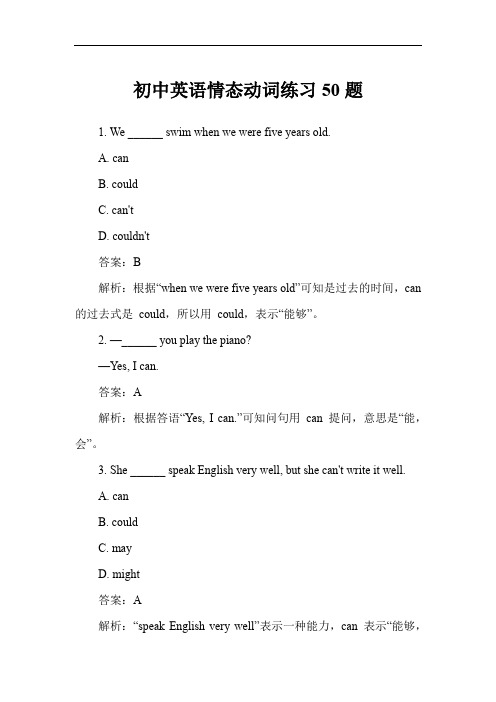
初中英语情态动词练习50题1. We ______ swim when we were five years old.A. canB. couldC. can'tD. couldn't答案:B解析:根据“when we were five years old”可知是过去的时间,can 的过去式是could,所以用could,表示“能够”。
2. —______ you play the piano?—Yes, I can.答案:A解析:根据答语“Yes, I can.”可知问句用can 提问,意思是“能,会”。
3. She ______ speak English very well, but she can't write it well.A. canB. couldC. mayD. might答案:A解析:“speak English very well”表示一种能力,can 表示“能够,会”,符合句意。
4. —______ I use your pen?—Sure. Here you are.答案:C解析:May I...? 表示征求对方的许可,意思是“我可以......吗?”5. You ______ be careful when you cross the road.A. canB. couldC. mustD. might答案:C解析:must 表示“必须”,过马路必须小心,强调必要性。
6. We __________ go to the park tomorrow if the weather is nice.A. mayB. mightC. mustD. can答案:A解析:“may”表示可能性,“might”语气更委婉、不确定,“must”表示必须,“can”表示能够。
根据语境,如果明天天气好,我们“可能”去公园,这里可能性较大,用“may”。
7. She __________ be late for the meeting. I'm not sure.A. mayB. mightC. mustD. can't答案:B解析:“I'm not sure.”表明不确定,“might”比“may”语气更不确定,所以这里用“might”表示她“可能”会迟到。
中考情态动词基础单选40题
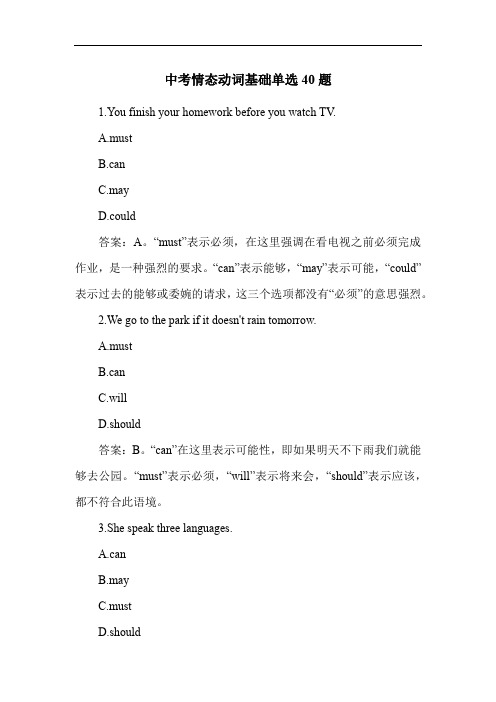
中考情态动词基础单选40题1.You finish your homework before you watch TV.A.mustB.canC.mayD.could答案:A。
“must”表示必须,在这里强调在看电视之前必须完成作业,是一种强烈的要求。
“can”表示能够,“may”表示可能,“could”表示过去的能够或委婉的请求,这三个选项都没有“必须”的意思强烈。
2.We go to the park if it doesn't rain tomorrow.A.mustB.canC.willD.should答案:B。
“can”在这里表示可能性,即如果明天不下雨我们就能够去公园。
“must”表示必须,“will”表示将来会,“should”表示应该,都不符合此语境。
3.She speak three languages.A.canB.mayC.mustD.should答案:A。
“can”表示能力,她能够说三种语言。
“may”表示可能,“must”表示必须,“should”表示应该,都不能表达她具有说三种语言的能力。
4.You borrow books from the library.A.canB.mustC.shouldD.need答案:A。
“can”表示可以,即你可以从图书馆借书。
“must”表示必须,“should”表示应该,“need”表示需要,都不符合此语境。
5.I be late for school today. I got up late.A.mayB.mustC.canD.should答案:A。
“may”表示可能,因为起晚了所以可能会迟到。
“must”表示必须,“can”表示能够,“should”表示应该,都不太符合此语境。
6.We take an umbrella. It might rain later.A.mustB.canC.shouldD.may答案:C。
“should”在这里表示应该,因为可能会下雨所以应该带伞。
九年级英语情态动词用法单选题40题

九年级英语情态动词用法单选题40题1. I heard a strange noise in the street. It ______ be a thief.A. mightB. mustC. can'tD. could答案:A。
本题考查情态动词表推测的用法。
选项A“might”表示可能性较小的推测,“可能是”;选项B“must”表示肯定的推测,“一定是”,但听到奇怪声音不能肯定就是小偷,程度太强;选项C“can't”表示否定的推测,“不可能是”,过于绝对;选项D“could”也可表示推测,但其可能性比“might”稍大。
在这个语境中,听到奇怪声音,推测可能是小偷,所以用“might”。
2. The boy looks very happy. He ______ have passed the exam.A. mustB. mightC. can'tD. should答案:A。
在这个情境中,男孩看起来很开心,“must”表示肯定的、有把握的推测,“一定是”通过了考试;选项B“might”可能性较小,不太符合男孩开心的状态;选项C“can't”表示否定推测,不符合;选项D“should”意思是“应该”,不是表推测。
所以选择A。
3. There is nobody in the classroom. They ______ be having a PEclass.A. mustB. couldC. mightD. can't答案:A。
教室里没人,“must”在此表示肯定推测,“一定是”在上体育课;选项B“could”和选项C“might”可能性较小,不如“must”肯定;选项D“can't”表示否定推测,不符合实际情况。
因此选A。
4. The light in the room is on. She ______ be at home.A. mustB. mightC. can'tD. could答案:A。
七年级七年级(完整版)英语情态动词练习题含解析

七年级七年级(完整版)英语情态动词练习题含解析一、选择题1.–This box is too heavy for me to carry upstairs.–__________A.You may ask for help B.I’ll give you a handC.Please do me a favor D.I’d come to help2.—Anna, can you come to my party tomorrow night?—_________, but I have to stay at home because of the flu.A.I’d love to B.Sounds good C.That’s OK D.Why not 3.—Another Friday! Let’s go to see the play tonight.—________ I will book the tickets online.A.My pleasure. B.That’s right.C.Why not? D.Never mind. 4.—I’m so s orry to keep you waiting for me so long.— ________!A.With pleasure. B.Don’t say so C.I don’t think so D.It doesn’t matter 5.—Don’t forget to keep safe distance (距离) at least one meter, Mike!—________A.Sorry, I won’t.B.No, I can’t do it.C.Not at all. D.I hope not. 6.—Liz, I’d like to take a week’s holiday.—________. We’re as busy as a bee.A.Go ahead B.With pleasure C.Forget it D.That’s right 7.—The game is too hard for me. I will certainly lose.—________. You should never say no before you try.A.Forget it! B.Come on! C.I’m sorry.D.Pardon me? 8.—Our family will go to Hangzhou for a holiday this summer.—________.A.Well done B.I am glad to hear thatC.Best wishes to you D.Have fun9.—Oh, no! There isn't any salt left.—____________! I’ll buy so me when I go into town.A.Good idea B.Go ahead C.Never mind D.Not at all 10.—I was too busy to see the singing competition.—________. I have to say it’s really wonderful.A.No problem B.You are welcome C.Not at all D.It’s a pity 11.—I thought I’d try to repair the car myself.— __________ ! You know nothing about the car.A.No way B.You can’t be serious C.I couldn’t agree more D.Don’t change a thing12.— The movie Lost in Russia sends a message about the importance of family.— ________. It reminds me of my parents.A.I hope so B.That’s all right C.You bet D.I don’t think so13.--Would you like to go shopping with me on Saturday?-- . I have to help my mother with housework.A.I’m afraid not B.Take your timeC.Enjoy yourself D.That’s all right14.—Our school football team has won the first prize in the match!—________A.Have a good time. B.Nice work. C.Never mind. D.Good luck. 15.— Could you please clean your room?—_________. I’ll do it at once.A.Yes, sure B.Sorry, I can’t C.It doesn’t matter D.Here you are 16.-Do you mind telling me how to use this function? - . It’s easy. Just double-click on the “Pencil” icon.A.No, not at all B.Of course, I doC.Yes, I do D.Yes, I don’t17.—Would you please help me with my spoken English?—__________. First you should know practice makes perfect.A.That’s right B.No problem C.Quite well D.No, thanks 18.— Shall we go to Nanjing Green Expo Park to enjoy the beautiful flowers this afternoon?—________. Let’s go there by bike.A.I think so B.That’s all right C.My pleasure D.Sounds great 19.—TV says there will be a heavy rain tomorrow.—________. I planned to go climbing with my friend.A.Bad luck B.I hope so C.Good idea D.I don’t mind 20.—I missed the basketball game last Saturday because I had an exam.—________, but it will be repeated on TV.A.Take it easy B.You are lucky C.That’s wonderful D.Never mind 21.—Do you like cartoons or scary movies?—_______. They can cheer me up.A.Yes, I do B.No, I don't C.Cartoons D.Scary movies 22.—Excuse me, can you give me some water? The cup is empty.—________A.Go ahead. B.My pleasure C.At your service D.You’d better not. 23.—You seem so happy today, Jack.—________? I won the first prize in the singing competition yesterday.A.So what B.How come C.Guess what D.Why not 24.—________. Where’s the nearest supermarket?—Oh, it’s about 300 meters away, next to a park.A.Thank you B.Excuse me C.Come on D.That’s OK 25.— I am so sorry to keep you waiting for such a long time.— ________.A.Please shut up B.It’s your mistake C.It doesn’t matter D.Don’t explain it 26.—He is too short to be a successful basketball player.—________ Every dog has its day.A.I think so. B.It’s hard to say.C.That’s right.D.You’d better not. 27.—Can you tell me how to get to the park?—________—Thank you all the same.A.Show me the map, please.B.Certainly. It’s opposite the museum.C.Sorry, I don’t know. I’m a stranger here.D.Sure. Turn right and go along Rock Road.28.—All of Mark Twain’s novels are popular.— ________. Especially The Adventures of Tom Sawyer.A.I can’t agree more B.That’s not the case C.That’s not the point D.Don’t mention it 29.—Could you help me look after my baby ________ I am away?—________.A.as; With pleasure B.while; My pleasure C.as; That’s all right D.while; With pleasure30.—Time is up. I have to go now.—________ ! We don’t have more time to talk.A.That’s cool B.That’s the answer C.That’s a pity D.That’s good news 31.—Don’t keep the water running when you brush your teeth.— ________ .A.I hope so B.I’m afraid no t C.Sorry, I won’t D.It’s nothing 32.—How do you find the documentary DA VID Profile(国宝档案).—________. I can’t think too highly of it.A.It all depends B.It’s really wonderfulC.No one knows for certain D.It is not my cup of tea33.—Would you mind if I open the window?—_______.We need fresh air.A.Not at all B.Yes, of course C.You’d better not D.That’s all right 34.—I find it really unwise to go travelling during May Day holiday.—________! Wherever you go, it’s crowded with cars and people.A.Not exactly B.Forget it C.You said it D.It depends 35.—Only those who have a lot in common can get along well.—________ Opposites sometimes attract.A.I think so. B.I don’t think so.C.I don’t care.D.I hope so. 36.—Only those who have a lot in common can get along well.—________. Opposites sometimes attract.A.I think so B.I don’t think so C.I don’t care D.I hope so 37.— The dress I got is not the same color as that is shown online.—________? But if so, I promise we will send you another one.A.How come B.Who knows C.What for D.Why worry38.— Mr. Smith, I won the first prize in the competition.—______ I think you’ll do better and better.A.Congratulations! B.Good idea! C.That’s all right!D.What a shame! 39.—Why don’t you join in a club to practise speaking Engli sh?—________.A.That’s a good idea B.Never mind C.Yes, please D.Thank you 40.—Hi, everybody! Here is the music.—________. Let’s dance to the music.A.That’s no good B.Here we go C.That’s a shame D.Have a good time 41.—How about putting some pictures into the report?—________ A picture is worth a thousand words.A.I don’t think so.B.Why not?C.Thank you. D.Don’t mention it.42.—I wonder if Tenny is doing well in her new school.—________. She is old enough to look after herself well.A.You’re welcome B.Good luck C.It’s a pity D.No need to worry 43.—Many people think women are better at cooking than men.—________. Most top chefs in the world are men.A.I agree B.I can’t agree more C.Not at all D.That’s not the case 44.— Wow, what a good smell! Can I have a piece of cake?— ________A.No way. B.Good idea! C.HeIp yourself. D.What a pity! 45.—I’ll have a chemistry exam tomorrow.—________!A.Well done B.Congratulations C.You’re welcome D.Good luck 46.—Summer camping gives children the chance to live away from home.—________. It is always good to help children grow up.A.That’s true.B.Come this way. C.Let me have a look. D.I don’t think we agree.47.— Would you mind my turning on the TV? The New Year concert has just begun.— ________. Just go ahead.A.Pl ease don’t B.Better not C.Of course not D.I’m afraid not 48.—I prefer to chat online. I’ve got to know many friends on the Internet.—________. Few of them would become your real friends.A.I can’t agree more B.I’m pleased to know thatC.That’s for sure D.That’s not the case49.—I visited the Purple Mountain Observatory by myself last Saturday.—________ Why didn’t you tell me earlier?A.You did? B.I hope not. C.Have a good time. D.I can’t believe it. 50.—How do you like coffee, Minnie?—It tastes very terrible. ________.A.I have no idea B.I don’t mind it C.I really can’t stand it D.I can’t afford it 【参考答案】***试卷处理标记,请不要删除一、选择题1.B【解析】句意:这个箱子太重了,我搬不上楼。
初中英语情态动词专项练习题

初中英语情态动词专项练习题情态动词:can could may might will would must have to need had better should情态动词特点1.情态动词没有人称和数的变化.2.情态动词后必须跟动词原形。
考点一:can,could, may,must 等情态动词的用法:1. can 的用法:(1).表示能力,译为“能、会”,即有种能力,尤其是生来具备的能力。
She can swim fast, but I can’t . 她能游得很快,但我不能。
I can see with my eyes. 我用眼睛看。
(2).表示许可,常在口语中。
You can use my dictionary. 你可以用我的字典。
(3).表示推测,条件: 常用于否定句和疑问句中,此时can’t 译为“ 不可能”。
Can the news be true? 这个消息会是真的吗?—Can it be our teacher?那个人有可能是我们老师吗?—No, it can’t be our teacher. He is on a visit to the G reat Wall.不可能。
咱们老师正在游览长城呢。
【例题】—I think Miss Gao must be in the library. She said she would go there. —No. She __be there, I have just been there. A.can’t B.mustn’t C.needn’t D.wouldn’t【解析】根据下文“我刚去过那儿”可知,应为“ 不可能”,can’t 表示推测[答案] A2. could的用法:(1).can的过去式,意为“ 能、会”,表示过去的能力。
He could write poems when he was 10. 他十岁时就会写诗。
(2). could在疑问句中,表示委婉的语气,此时could 没有过去式的意思。
- 1、下载文档前请自行甄别文档内容的完整性,平台不提供额外的编辑、内容补充、找答案等附加服务。
- 2、"仅部分预览"的文档,不可在线预览部分如存在完整性等问题,可反馈申请退款(可完整预览的文档不适用该条件!)。
- 3、如文档侵犯您的权益,请联系客服反馈,我们会尽快为您处理(人工客服工作时间:9:00-18:30)。
初中英语语法专项习题——情态动词
1( ) 1 John___ come to see us tonight, but he isn't very sure yet.
A. may
B. can
C. has to
D. must
( ) 2 They ___ do well in the exam.
A. can be able to
B. be able to
C. can able to
D. are able to
( ) 3 -May I take this book out?
-No, you___.
A. can't
B. may not
C. needn't
D. aren't
( ) 4 You___ go and see a doctor at once because you're got a fever.
A. can
B. must
C. dare
D. would
( ) 5 -Can you speak Japanese?
-No, I____.
A. mustn't
B. can't
C. needn't
D. may not
2( ) 1 -He___ be in the classroom, I think.
-No, he ___ be in the classroom. I saw him go home a minute ago.
A. can; may not
B. must; may not
C. may; can't
D. may; mustn't
( ) 2 -Shall I get one more cake for you, Dad?
-Thanks, but you___, I've had enough.
A. may not
B. must not
C. can't
D. needn't
( ) 3 Even the top students in our class can't work out this problem, so it be very difficult.
A. may
B. must
C. can
D. need
( ) 4 He isn't at school. I think he ___ be ill.
o A. can B. shall C. must D. has to
( ) 5 ___ I take this one?
A. May
B. Will
C. Are
D. Do
3( ) 1 The children___ play football on the road.
A. can't
B. can
C. mustn't
D. must
( ) 2 You ___ be late for school again next time.
A. mustn't
B. needn't
C. don't have to
D. don't need to
( ) 3 -Must I do my homework at once?
-No, you___.
A. needn't
B. mustn't
C. can't
D. may not
4( ) 1 His arm is all right. He___ go and see the doctor.
A. has not to
B. don't have to
C. haven't to
D. doesn't have to
( ) 2 He had to give up the plan, ___ he?
A. did
B. didn't
C. does
D. doesn't
( ) 3 They had to walk here, ___ they?
A. mustn't
B. did
C. didn't
D. hadn't
5( ) 1 He had better stay here, ___ he?
A. didn't
B. don't
C. hadn't
D. isn't
( ) 2 You'd better___late next time.
A. not to be
B. not be
C. won't be
D. don't be
( ) 3 You'd better ___ your hair ___ once a month.
A. had; cut
B. had; cutted
C. have; cut
D. have; cutted
( ) 4 You___ ask that man over there. Maybe he knows the way.
A. had better not to
B. had not better
C. had better
D. had better not 6( ) 1 -Shall we go and visit the HistoryMuseum next Sunday?
A. Here you are
B. Sorry, I can't
C. Yes, please
D. Let me try
( ) 2 -Why don't you ask Mike to go with us?
-Thanks, ___.
A. I will
B. I won't
C. lean
D. I may
( ) 3 -___ I take the newspaper away?
-No, you mustn't. You____read it only here.
A. Must; can
B. May; can
C. Need; must
D. Must; must
7( ) 1 Excuse me. ___ you please pass me that cup?
A. Do
B. Should
C. Would
D. Must
( ) 2 ___ you like to have another try?
A. Could
B. Will
C. Would
D. Do
( ) 3 -Would you like to go boating with us?
-Yes, ___.A. I'd like B. I want C. I'd like to D. I do
8( ) 1 You___ worry about your son. He will get well soon.
A. needn't
B. can't
C. mustn't
D. have to
( ) 2 The poor man needs our help, ___ he?
A. need
B. needn't
C. does
D. doesn't
( ) 3 -Must we do our homework first?
-No, you___. You may have a rest first.
A. mustn't
B. needn't
C. may not
D. can't
参考答案:
1. 1-5 A D A B B
2. 1-5 C D B C A
3. 1-3 C A A
4. 1-3 D B C
5. 1-4 C B C C
6. 1-3 B A B
7. 1-3 C C C
8. 1-3 A D B。
